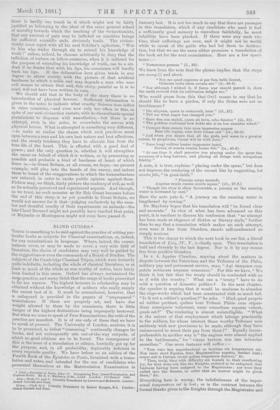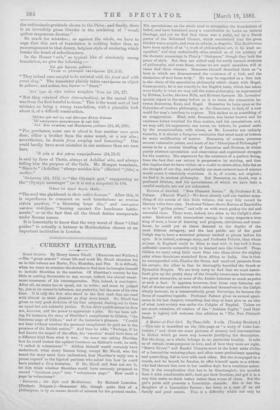BLIND GUIDES.*
'THERE is something to be said against the practice of setting par- ticular books as subjects for Classical examinations, or, indeed, for any examinations in language. Where, indeed, the exami- nations cover, or may be made to cover, a very wide field of literature, the choice of candidates may very well be guided by the suggestions or even the commands of a Board of Studies. The subjects of the Cambridge Classical Tripos, which were formerly quite indefinite, including the whole of classical literature, or at least so much of the whole as was worthy of notice, have lately been limited in this sense. Oxford has always maintained the sae practice, and many think that the range of books prescribed is far too narrow. The highest honours in scholarship may be obtained without the knowledge of authors who really supply the surest test of it. It must be remembered, however, that a safeguard is provided in the papers of " unprepared " translations. If these are properly set, and have due weight allowed to them by the examiners, there is little danger of the highest distinctions being improperly bestowed. But when we come to speak of Pass Examinations, the evils of the practice are manifest. It is of one only of these that we have to speak at present. The University of London, anxious, it is to be presumed, to defeat " Cramming," continually changes its books, and not unfrequently sets out-of-the-way subjects, of which no good editions are to be found. The consequence of this is the issue of a translation or edition, hurriedly got up for the purpose, and, in all probability, deplorably deficient in every requisite quality. We have before us an edition of the Fourth Book of the Epiatotas ex Panto, furnished with a trans- lation and notes, and intended for the use of candidates who Vrosented themselves at the Matriculation Examination in a Ouid.—Epistolae est Panto, Liber IV. Comprising Text, LiteralTranslatIon, and Copious Notes. By A. C. Maybury, D.Be., Lond. London : 178 Strand. 1880. Liry.—Books IV. and V. Literally Translated by Laurent and MoDewitt. London : James Cornish and Sons.
Homer,-1 ads 21.4. Literally Translated by Roscoe /dongan, B.A. London: -James Cornish and Sons. January last. It is not too much to say that there are passages in this translation, which if any candidate who used it had
a sufficiently good memory to reproduce faithfully, he must infallibly have been plucked. If there were any such vic- tims, their sufferings are over, and it might not be worth while to speak of the guide who had led them to destruc- tion, but that we see the same editor promises a translation of the book set for the next examination. Here are a few speci- mens :- " Numeroaos gressus (ii., 33).
We learn from the note that the phrase implies that the steps are many (!) and short.
"Nee me (pod ouperem si per fere, bolls, liceret, Oblectat eultu terra novata sue" (ii., 43.4).
"Nor although I wished it, if fierce war should permit it, does the earth revived with its cultivation delight me."
Who would guess from this that Ovid means to say that he should like to have a garden, if only the Getae were not so troublesome P
" Die aliquam, quam to mutaverit, iram " 21). " Toll me what anger has changed you."
" Haeo deft non stabili, quam sit levis, orbo fatetur " 31). "The goddess confessed how fickle she is on her unstable wheel."
" Cumque dens omnos, turn coos impensius aequos Esse tibi oupias, cum Jove Comex orit " (iv., 83-4).
"And when you desire that all the gods, and some to a greater extent, be propitious, Ceusar will be with Jove."
" Nuuo longi reditus hostile supponere lustri,
Cornet, et exacta cunota locare fido " (ix., 45.6).
" At one time it shall perceive you placing under the spear the revenues of a long lustrum, and placing all things with scrupulous fidelity."
A note, it is true, explains " placing under the spear," but does not improve the rendering of the second. line by suggesting, for exacta fide, "in good-faith."
" Flumine mope seoundo
Augetur remis cursus otentis aquae." (xii., 27-8.) " Though the river is often favourable, a journey on the running water is increased by oars."
Here the note puts it, " A. journey on the running water is lengthened by rowing."
Dr. Maybury hopes that his translation will " be found clear and accurate." In view of what has been advanced on this point, it is needless to discuss his confession that "no attempt has been made at elegance of diction or literary style," further than to say that a translation which makes no such attempt, even were it free from blunders, stands self-condemned as simply noxious.
This is the charge to which the next book in our list, a literal translation of Livy, IV., V., is chiefly open. This translation is bald and slovenly to the last degree. Nor is it by any means free from positive blunders.
In v. 4, Appius Claudius, arguing about the matters in dispute between the Patricians and the Tribunes of the Plebs, military pay and permanent service, says, " A gi tauquam cum
patria nobiscum aequum censemus." For this we have, " We think it but fair that the treaty should. be conducted with us as if with the country." What can a " treaty " have to do with a question of domestic politics P In the next chapter, the speaker is arguing that it would be madness to abandon the siege-works which had been constructed with so much toil. "Is it not a soldier's question P" he asks. " Illud, (plod proprie
ad milites pertinet, quibus boni Tribuni Plebis cum stipen- dium extorquere voluerunt, nuns consultum repente volunt, quale est P" The rendering is almost unintelligible. " What is the nature of that employment which belongs practically to the soldiers, for whose interest those worthy Tribunes now suddenly wish new provisions to be made, although they have endeavoured to wrest their pay from them P" Equally incom- prehensible in another way is "the engines were almost applied to the battlements," for " vineao tantum non iam iuiunctae moenibus." One more instance will suffice :—
" Tum vero iam superfundenti se laetitiao vix tomperatum est. Non enim sicnt Equites, dato Magistratibus negotio, laudari iussi ; neque ant in Curiana vocati quibus rosponsum daretur," &c.
" Then, truly, they with difficulty set bounds to their overflowing joy, for they were not, like the Knights, ordered to be eulogised, that business having been assigned to the Magistrates ; nor were they called into the Senate, in order that an answer might be given them," &o.
Everything here is wrong; the indefiniteness of the imper- sonal teniperatum, est is lost ; so is the contrast between the formal thanks given to the Knights through the Magistrates and
the enthusiastic gratitude shown to the Plebs ; and finally, there is an incredibly gross blunder in the rendering of " vocati quibus responsum daretur."
So much for mistakes ; as against the whole, we have to urge that this sort of translation is nothing better than an encouragement to that dreary, helpless style of rendering which breaks the heart of schoolmasters.
In the Homer " crib," as typical bits of absolutely wrong translation, we give the following i-
Toi pas ;Orroto FEUVTO "Ifsrmot) TE yxwcepoi", Taprittesat (24, 2-3).
"They indeed were careful to be satiated with the feast and with sweet sleep." The translator plainly takes rapIrtithEmar as object to /Am.° ; and notice, too, Upros =" feast."
gV),% ws eqm, rpigrom "ixioc 1,o4 (24, 27).
" But they retained (their determination), as the sacred Ilium was from the first hateful to them." This is the worst sort of bad mistake, as being a wrong translation, with a plausible look about it, of a difficult construction.
AlOom ,ehiv 7roi% TEC sal qrnvrepoa agATom OXioecti IIi ,totelys>rros ettoyiterpros ie *al 144. 'A4?,' ire; x.Xctt;ecei zeti auptipepoc Ate.ibp‘s (24, 49,.599).
"For, perchance, some one is about to lose another even more dear, either a brother from the same womb, or a son also ; nevertheless, he desists from weeping and lamenting." One could hardly have more mistakes in one sentence than are seen here.
'II yap oi clue ;.t.tirep wapiseigAsncss (24,72-3) is said by Zeus of Thetis, always at Achilles' side, and always telling him the purpose of the Gods. Mr. Mongan translates, " Since he" (Achilles) " always watches him" (Hector) "[like] a mother."
'Oxi;f4..vro; (24, 175) = "the Olympic god," reappearing as the ".Olympic messenger" (so it is not a misprint) in .194.
navy eve cppgal Buffos
"The soul was gladdened in their entire bosoms." After this, it is superfluous to comment on such translations as .vrExiey ii)pvicc pricaay, " a, blooming large elm," and meXA1(4gPOC PECZX'nTlY E'T/GXETIP, "leaning against the handsome battle- ments," or on the fact that all the Greek deities masquerade under Roman names.
It is lamentable to know that the very worst of these "Hind guides" is actually a lecturer to Matriculation classes at an important institution in London.



































 Previous page
Previous page